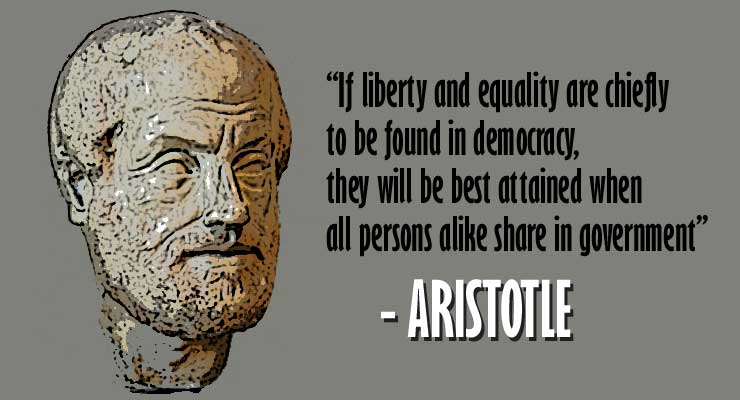
Politics involve two fundamental factors: (1) The organization of interactions among humans, and (2) our natural focus on providing food, clothing and shelter for ourselves and our families.
As the number of humans in close proximity to each other increases, the need for organization of human interactions increases, but the majority of people are more concerned with their own needs than they are with the needs of their society. This results in a power vacuum that is filled by power-hungry individuals who gratify themselves by providing the organization (rules) the society needs.
These power-hungry individuals are autocratic. When their rule is considered excessive by the people, the people demand a greater say in their own governance. Successful autocrats recognize the latent power in the people they rule and do what they can to meet their people’s needs without compromising their own authority. Unsuccessful autocrats inflame the people to revolt.
Revolutions require leaders. Usually, the leaders are power-hungry individuals who seek to replace the existing order. They are, or become, masters of inciting public ardor in their favor. Their goal is not to empower the people, but, in recent centuries they have used that as their rallying cry. That was true, even in our own country, where the leading figures, with the exception of George Washington who strenuously opposed their efforts, formed political parties to support their bid for power.
True democracy has no champions. It offers no rewards for individuals or vested interests; it gives no individual or group an advantage over others. Hence, it offers no incentive for power-seeking individuals or groups to advocate its adoption.
Democracy will not succeed until we recognize that there are many among us with the ability and the integrity to improve our lives. We must devise a way to seek them out and raise them to public office as our representatives in our government.
Liam M says
I want epistocracy to replace the current “one person one vote” form of democracy. I want a moderate form of epistocracy, which is not too undemocratic. The results should represent what people would vote for if they were well informed.
I feel like more knowledgeable people would make less selfish decisions, because they can predict the societal impact of policies, not just the personal effect. Actually, many voters are bad at knowing whats good for themselves as well.
The main issue with epistocracy is how to implement it. How do you determine how knowledgeable people are without partisan bias? There should be research on how to implement epistocracy.
I’m also an advocate for the use of citizens assemblies. While referendums are notorious for being poisoned by misinformation campaigns, citizens assemblies are made of citizens who are brought into the loop, as they get to join a debate.
Fearmongering is also a huge issue in democracy. While epistocracy would reduce it’s efficacy, I also think people need to be educated to recognize it.
Fred Gohlke says
Good Afternoon, Liam M
Can you tell me, in epistocracy, who decides which citizens have the political knowledge to rule? I ask because it seems to me you are talking about the Practical Democracy concept, which is described here on Democracy Chronicles at
https://democracychronicles.org/practical-democracy/
The Practical Democracy process provides the filtering and selecting mechanism that lets the citizens decide decide which of their number have the political knowledge and ability to advance the common interest. That sure sounds like epistocracy to me and it offers several advantages:
* It eliminates money from politics,
* it incorporates partisanship without letting partisans control the process,
* it completes more quickly than our present system,
* it functions without political campaigns or the marketing of candidates,
* it enables and encourages dialogue and deliberation on political issues among the electorate,
* it lets the people change their representatives as they see fit,
* it is a bottom-up arrangement that lets every member of the community influence political decisions to the full extent of each individual’s desire and ability,
* it ensures that candidates for public office are examined carefully BEFORE they are elected, and
* it builds on agreement by the members of the electorate rather than on confrontation.
Is that not the essence of an epistocratic political process? If you’d care to critique it in terms of the system you seek, I’ll respond as thoughtfully as I can.
Fred Gohlke